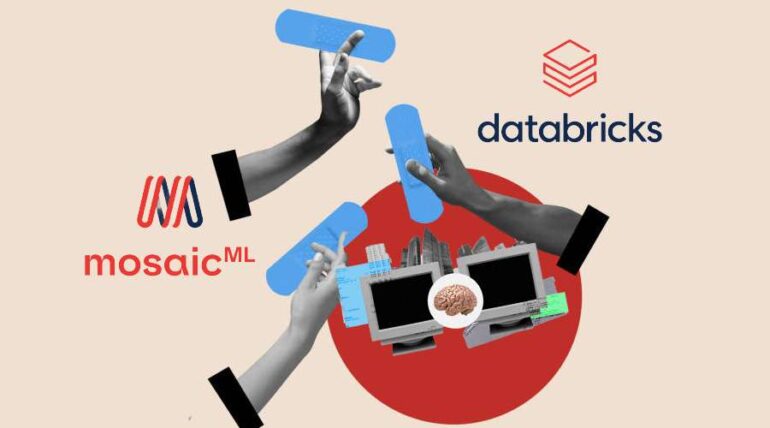TL;DR:
- Databricks acquires generative AI startup MosaicML for $1.3 billion.
- The acquisition facilitates the training and deployment of custom machine learning models for private entities.
- Databricks’ platform complements MosaicML’s tools, enabling businesses to leverage their own data.
- Concerns over proprietary information and model behavior are addressed through model ownership and transparency.
- MosaicML’s cost-effective open-source language models offer alternatives to expensive alternatives.
- Smaller models catered to businesses seeking task-specific performance and reduced development costs.
- The partnership expands Databricks’ customer base and strengthens its machine-learning pipeline.
- All 64 employees of MosaicML will join the combined business.
Main AI News:
Databricks, a leading data engineering platform, has recently made headlines with its acquisition of MosaicML, a generative AI startup, in a deal worth a staggering $1.3 billion. This strategic move is set to revolutionize the landscape of private entities seeking to train and deploy their own custom machine learning models, making the process more accessible and efficient than ever before.
The partnership between Databricks and MosaicML is a natural progression, as both companies bring complementary strengths to the table. Databricks boasts a robust platform that empowers customers to seamlessly organize and manage incoming data from various sources within their own cloud clusters. On the other hand, MosaicML specializes in providing cutting-edge tools to swiftly create tailored AI models at a fraction of the usual cost.
This union establishes a powerhouse duo, possessing not only the technical infrastructure but also the expertise required to entice large enterprises keen on leveraging their proprietary data to train and deploy generative AI systems. While many small and medium-sized businesses are eager to adopt machine learning, they are often hesitant to rely on off-the-shelf models developed by private companies.
A key concern revolves around safeguarding proprietary information from potential competitors and uncertainty surrounding the behavior of these models. For instance, industry giants like OpenAI and Google do not disclose the precise data used to train their models, leaving room for unexpected outcomes that are difficult to predict.
Naveen Rao, CEO and co-founder of MosaicML, emphasized the significance of model ownership in the adoption of these capabilities: “Whatever data is used to train a model, that model now represents that data, and so wherever the model weights go, the data has gone. So for enterprises to really start to adopt these capabilities, model ownership has to be respected to respect their data privacy balance.”
By joining forces, Databricks and MosaicML offer a tangible solution to this predicament, providing enterprises with a clear understanding of the data used in their model training processes. The acquisition equips Databricks with enhanced AI resources, while MosaicML gains access to richer datasets, enabling the development of more robust custom private models.
In recent months, MosaicML has garnered attention by releasing two open-source large language models, namely the MPT-7B and the MPT-30B. These models have demonstrated that training can be accomplished at a fraction of the cost required by alternative model-makers, potentially saving hundreds of thousands of dollars. While these smaller models may not possess the same comprehensive capabilities as behemoths like GPT-4, they serve a specific purpose desired by businesses seeking optimal performance in targeted tasks. Additionally, smaller models grant organizations greater control over the system and help reduce development costs.
Rao emphasizes the importance of favorable economics in this context: “The economics have to be favorable. It really comes down to how optimized you can make it. Every time you type into ChatGPT, it’s doing an inference call and it’s spitting out words. Each one of those is basically running on a web server of eight GPUs. That server costs $150,000, approximately, to build. So there’s a real hard cost to this. Really optimizing that stack – hacking multiple requests together and utilizing the hardware effectively – is the name of the game. It’s much more about making it super efficient so that you’re not unnecessarily wasting GPU time on a smaller scale per request.“
The custom AI market is gaining momentum, and through its collaboration with Databricks, MosaicML is well-positioned to target larger customers across diverse industries. Databricks, already serving over 10,000 organizations globally, now possesses an even stronger machine-learning pipeline with the inclusion of MosaicML’s powerful tools. This positions them favorably against competitors and enables them to retain existing customers as the demand for AI continues to surge.
The anticipated completion of the deal in July will see all 64 employees of MosaicML transition to the combined business entity. This consolidation of talent and resources underscores the shared commitment of Databricks and MosaicML to drive innovation and empower organizations in their pursuit of effective and private machine learning solutions.
Conclusion:
Databricks’ acquisition of MosaicML signifies a significant development in the market for private custom machine learning models. By combining their strengths, Databricks and MosaicML can offer a comprehensive solution that addresses the concerns of enterprises regarding proprietary data and model behavior. The transparent approach to model ownership and access to cost-effective language models positions them as an attractive choice for businesses seeking tailored AI solutions. This strategic move enhances Databricks’ market position, enabling them to target larger customers and solidify their presence in the evolving landscape of AI-driven business analytics.

